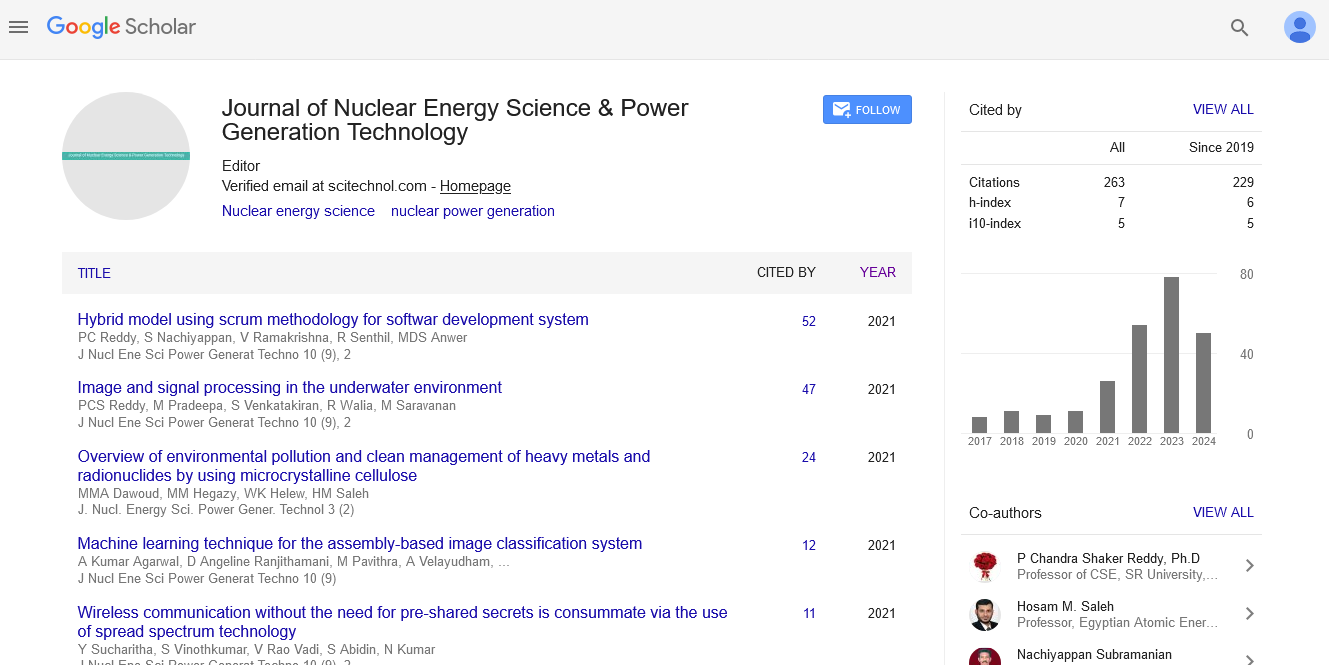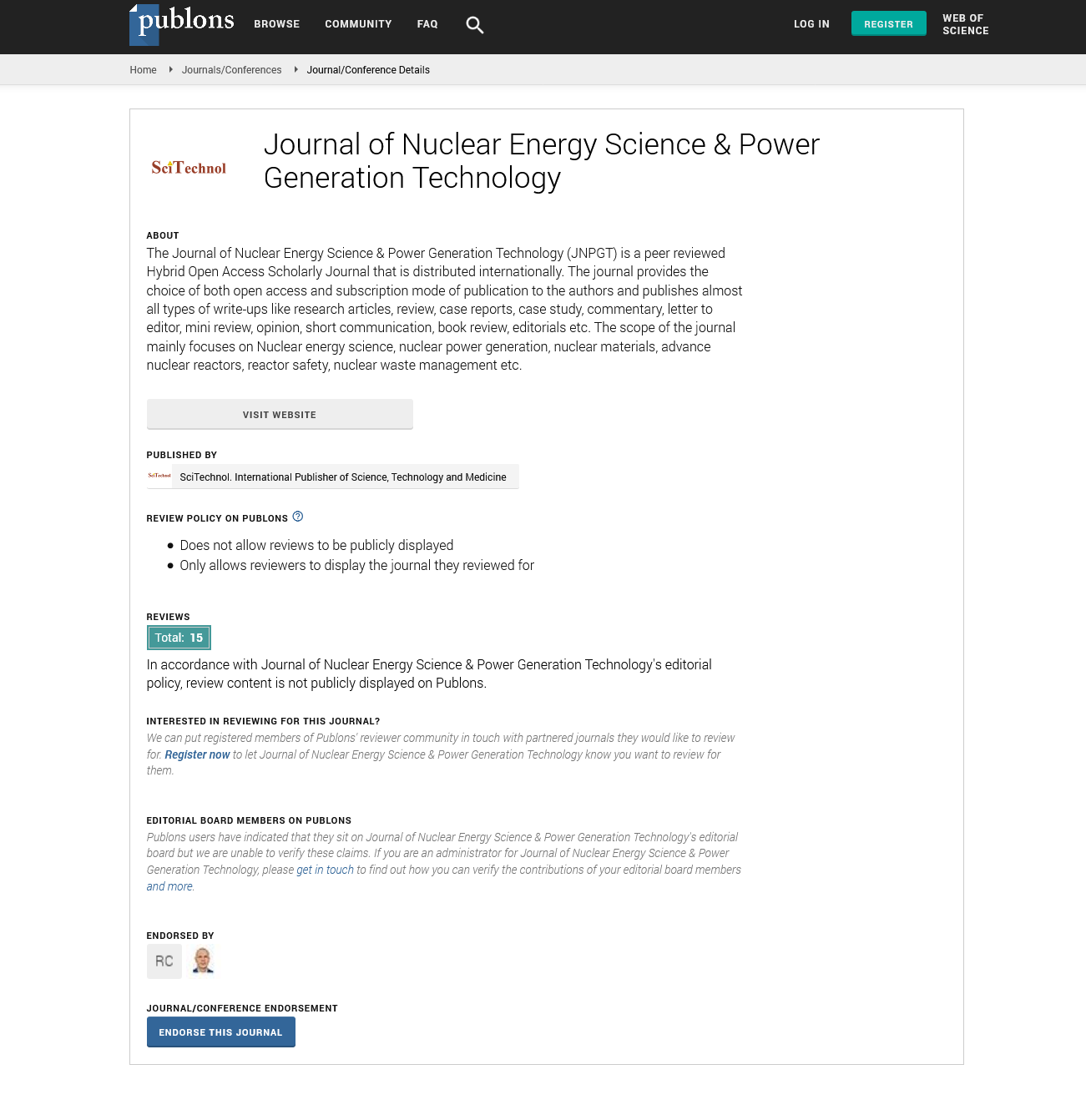Commentary, J Nucl Ene Sci Power Generat Technol Vol: 12 Issue: 3
Exploring Diverse Applications in Nuclear Engineering
Yue Zin*
1Department of Mechanical and Aerospace Engineering, The Hong Kong University of Science and Technology, Hong Kong, China
*Corresponding Author: Yue Zin,
Department of Mechanical and Aerospace
Engineering, The Hong Kong University of Science and Technology, Hong Kong,
China
E-mail: yuezin1112@gmail.com
Received date: 24 April, 2023, Manuscript No. JNPGT-23-102515;
Editor assigned date: 28 April, 2023, PreQC No. JNPGT-23-102515 (PQ);
Reviewed date: 15 May, 2023, QC No. JNPGT-23-102515;
Revised date: 23 May, 2023, Manuscript No. JNPGT-23-102515 (R);
Published date: 31 May, 2023, DOI: 10.4172/2325-9809.1000342.
Citation: Zin Y (2023) Exploring Diverse Applications in Nuclear Engineering. J Nucl Ene Sci Power Generat Technol 12:3.
Keywords: Nuclear engineering
Description
Nuclear engineering is a multidisciplinary field that encompasses various applications across different sectors. It involves the study and utilization of nuclear processes, radiation, and materials to address a wide range of challenges. From power generation to medicine, space exploration to environmental protection, nuclear engineering plays a vital role in advancing technology, improving human health, and ensuring a sustainable future. This delves into the diverse applications of nuclear engineering, highlighting its contributions to various industries and the significant impact it has on our daily lives.
Nuclear power generation
One of the most prominent applications of nuclear engineering is in power generation. Nuclear power plants utilize nuclear fission reactions to generate large amounts of electricity with low carbon emissions. Nuclear reactors produce heat through controlled nuclear reactions, which then convert water into steam to drive turbines and generate electricity. Nuclear power provides a reliable and sustainable energy source, contributing to global energy security and reducing greenhouse gas emissions.
Nuclear medicine
Nuclear engineering has revolutionized the field of medicine through its applications in nuclear medicine. Techniques such as Positron Emission Tomography (PET) and Single-Photon Emission Computed Tomography (SPECT) utilize radioactive isotopes to diagnose and treat diseases. Radioisotopes are used in imaging procedures to visualize organ function and detect abnormalities. They are also employed in radiation therapy to treat cancer by precisely targeting and destroying cancerous cells.
Industrial applications
Nuclear engineering finds extensive applications in various industrial sectors. Non-Destructive Testing (NDT) techniques, such as radiography and ultrasonic testing, are used to inspect and evaluate the integrity of structures, pipelines, and industrial equipment. These methods ensure the safety and reliability of difficult infrastructure.
In addition, nuclear techniques are utilized in industries like agriculture, food processing, and environmental monitoring. Irradiation can be applied to food products to increase their shelf life, eliminate pests, and reduce spoilage. Nuclear instruments and methods are employed for monitoring and assessing environmental pollution, studying air quality, and evaluating water resources.
Space exploration
Nuclear engineering plays an important role in space exploration missions. Nuclear power sources, such as Radioisotope Thermoelectric Generators (RTGs), provide long-lasting and reliable power for spacecraft, particularly in missions where solar power is insufficient. RTGs have powered deep space missions, including the Mars rovers, by converting the heat generated from radioactive decay into electricity.
Future space exploration endeavors, such as crewed missions to Mars, may require nuclear propulsion systems. Nuclear thermal propulsion and nuclear electric propulsion offer higher efficiency and faster travel times compared to conventional propulsion methods, enabling ambitious missions beyond Earth's orbit.
Conclusion
The applications of nuclear engineering are diverse and farreaching, impacting numerous industries and aspects of our lives. From providing clean and reliable energy through nuclear power generation to revolutionizing medical diagnostics and treatments, nuclear engineering continues to advance technology and improve human wellbeing its contributions to industrial applications, environmental monitoring, and space exploration further highlight the versatility and significance of this field. As technology continues to evolve, nuclear engineering will play an increasingly vital role in addressing global challenges and shaping a sustainable future.
 Spanish
Spanish  Chinese
Chinese  Russian
Russian  German
German  French
French  Japanese
Japanese  Portuguese
Portuguese  Hindi
Hindi 

